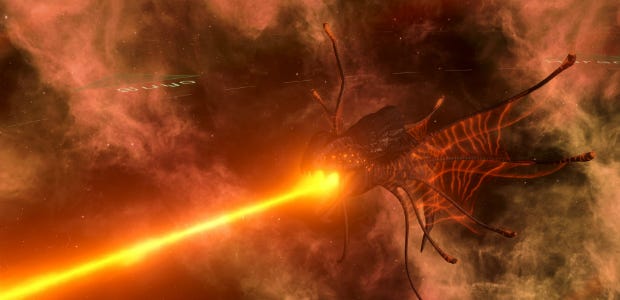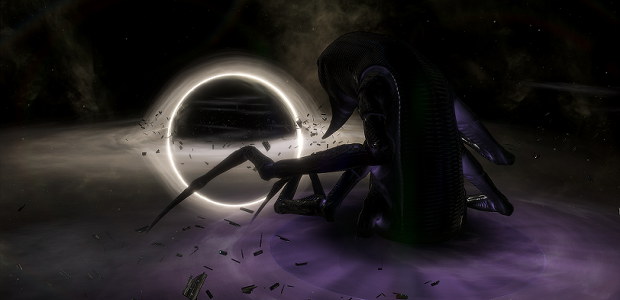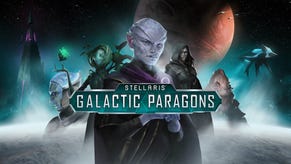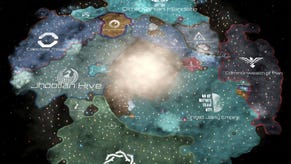Wot I Think: Stellaris - Leviathans
Space Dragons & UI Improvements
Space dragons, wars in heaven, awakening gods, secret enclaves and (most delicious of all) user interface improvements. Stellaris: Leviathans [official site] brings some gargantuan beasts and big features to Paradox's sci-fi strategy game, but is it a small step forward or a great leap into the unknown?
With Leviathans, and more notably the free Heinlein update that arrived alongside the paid-for story pack, Stellaris shows sure signs that it will fulfill its early promise. I liked the game far more than many other critics around the time of release and while I think the game as it stood on launch day was fantastic (if flawed), I was open about my expectation that it would be a foundation for greater things. That's how Paradox grand strategy games tend to work. No matter what the state of their release, they're going to be much-changed a year or two down the line.
The trick of Stellaris is its knitting together of two genres that are adjacent to one another, but unaccustomed to intermixing their inner workings. By taking elements of grand strategy and planting them firmly in a 4X structure, Paradox created something fascinating, though not without rough edges and areas where the design is so taut as to wear thin. The density of a Europa Universalis or Crusader Kings, with a world packed full of characters creating and springing from history, is not there.
In the Fallen Empires and many of the stories that science ships can discover there is a sense of the past – of the millions of years that have lead to the point at the start of the game when you begin with the 4X staple of a single territory to develop and expand from – but the world is full of gaps waiting to be filled. That's not true in a historical grand strategy game, where the map is already written and is waiting to be defaced and/or amended. In Stellaris, the points of interest are in place but they're unoccupied, for the most part, and the shape of the galaxy is yet to be decided.
As mentioned, Fallen Empires are the exception. In the base game, they're big bastard blockades, often preventing expansion for the smaller galactic newcomers (yourself included). They divide the galaxy into sections, so powerful as to be effectively impassable, like a mountain range or ocean. Though they have their own personalities, from peacekeepin' police of the galaxy to wannabe-worshipped faux gods, I tend to think of them all as something between boss fight and barely sentient terrain feature.
Leviathans goes a long way toward making Fallen Empires the unpredictable beasts I'd hoped for. Central to their new appeal is the introduction of an additional end-game crisis called The War In Heaven. This sees two of the monstrous empires deciding to clobber one another, and it's as if the titans themselves were clashing and you, as the equivalent of a mere mortal watching the sky tear itself apart and punch itself in the face, either need to pick a side or run back to your cave and hide.
It's great to see sleeping giants waking up a bit testy, and figuring out how to react when you realise they've got out of the wrong side of the bed and decided to punch a hole in the wall is exciting. That's not all Leviathans brings to the table though. Paradox have labelled it a Story Pack rather than a full-fat expansion (there's one of those on the way though), but it does add three major features along with the splendidly written plotlines that are threaded around those features.
The War in Heaven is one of those features. The others are Guardians, another type of boss-level encounter that you may recognise from pre-release art, and Enclaves. It's in the latter that the true value of Leviathans can be seen. Flashy and impressive as they are, the Guardians and changes to Fallen Empires only impact on the game in its later stages; Enclaves do the more difficult job of making the long stretches a little more appealing.
They do so by allowing trade of basic resources. That might seem like the most boring feature imaginable but it goes a long way toward making the somewhat arbitrary allocation of resources less of a hindrance. There's a new flexibility in empires now that they can dominate in one area of resource gathering without cutting themselves out of the loop entirely, and that creates more possibilities when it comes to deciding both short- and long-term goals.
There's more to Enclaves than trading but some of their functionality is best left as a mystery, as are the storylines surrounding the Guardians. Sadly, in the case of Guardians, the stories are more interesting than the creatures themselves, who are powerful and exciting on first encounter, but become, like Fallen Empires, system-blockers. Researching them and learning about them is more interesting than throwing an enormous fleet at them, but either way, they're not going to impinge on your plans until the late stages of a game.
Leviathans is a worthwhile addition if you enjoyed what Stellaris had to offer, but it's not the leap forward that might win over those who felt the base game was somewhat lacking. As with Europa Universalis IV's recent expansion, Rights of Man, the meat might actually be in the free patch released alongside the expansion.
Paradox have been delivering hefty free updates to their internally developed games (and some others) for a long time now. It's part of what makes the sheer volume of DLC palatable, though I'd argue that the quality of the vast majority of that DLC is the main reason I'm happy that there is so much of it. With Stellaris' 1.3 patch though, named Heinlein, there are not only some decent quality of life improvements that address issues with the UI, there are also some suggestions as to what might be coming in future updates.
First of all, Federations have been made vastly more important thanks to the addition of a victory type associated with them. We've covered the disappointment of the base game's victory conditions https://www.rockpapershotgun.com/2016/07/06/stellaris-victory-conditions-flaws/ and while Federation victories are by no means a complex addition (if 60% of habitable planets are within Federation members' borders, victory is won), they allow for deeper roleplaying within the game's systems. Behaving benevolently feels like a legitimate course now and Star Trek is a greater possibility than ever before.
The UI looks much as it did but under the hood, there are some useful additions. Auto-exploration cuts down on the time spent herding ships around the galaxy and an expansion planner provides not only a handy list of habitable planets discovered, but the means by which to carry out large-scale imperial ambitions without dragging and clicking your way around a big stack of systems.
Most striking is a change to Fallen Empires that has made its way into the base game. They can wake up now, dusting themselves down and deciding to become active in the galaxy again. Without Leviathans, they'll never follow the storylines that lead to a War in Heaven, but they will interfere with other empires' business.
It's that awakening of Fallen Empires that makes the worlds of Stellaris feel much more alive. It still doesn't have the living history of a grand strategy title but is finding its own way of bringing dynamic, emergent events to its galactic maps. The 4X side of the game is improved by the Enclaves and by the UI improvements, and the grand strategy side is expressing itself more eloquently through the medium of those Fallen (and Awakened) Empires, and the stories that are written for them as well as the ones that they write themselves, through the game's code and its interaction with a player's plans.
As I said earlier, this isn't the expansion or the patch to convince those who weren't already convinced by what Stellaris has to offer, but it brings plenty of alterations and additions for those already on board. More than that, it's an indication that the studio have ideas as to how the universe can become more lively, without making it more cluttered at the same time, and that makes the future of Stellaris very exciting indeed.
Stellaris: Leviathans is available now.





















